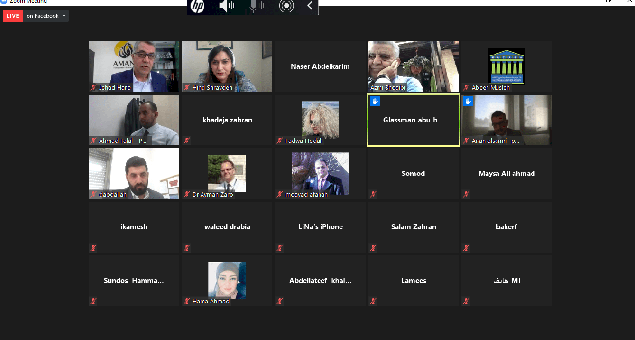
In a discussion session on money laundering and associated challenges
AMAN Coalition invited the National Anti-Money-Laundering Committee (NAMLC) to share reports and information with the civil society organizations
Ramallah – The Coalition for Integrity and Accountability-AMAN organized via Zoom a session to discuss its draft report on combatting money-laundering and enforcement of the national anti-money-laundering strategy. The meeting aimed at assessing the challenges that obstruct the implementation of this strategy and at formulating pragmatic and feasible recommendations to submit to decision-makers.
The study explained that money-laundering has been criminalized in Palestine following the enactment of Decree Law on Combatting Money Laundering of 2007, which was later amended in 2015 to promote effectiveness in fighting this crime.
According to the study, the banking sector in Palestine is where the highest risk of abuse to launder proceeds of original crimes lies. Other sectors include the real-estate sector because of land is divided in Palestine and due to unrealistic high prices of property. Thus, money launderers pay huge sums to purchase land and property to cover the origin of their proceeds.
A strategy that lacks an action plan and enforcement mechanism
The study showed that the National Anti-Money Laundering Committee is functioning without an action plan, which hinders its ability to fully enforce the national strategy and combat this crime in the targeted sectors, namely financial and real-estate corporations. There isn’t any clear mechanism to implement this strategy or distribute roles to stakeholders. As a result, it remains with very limited effect on the ground.
Weak transparency and non-disclosure of data by NAMLC
AMAN Coalition expressed its dissatisfaction with the NAMLC’s refusal to open up to civil society organizations and researchers and non-publication of any relevant reports, data or statistics on the prevalence of this crime and criminal proceeds although it is compelled by law to publish a national assessment of money-laundering risks. Consequently, AMAN Coalition called on NAMLC to fulfil its duties, monitor the financial follow-up unit and publish relevant reports on anti-money laundering efforts in addition to cooperating with civil society organizations.
Competent staffing is needed
The study recommended to give priority to training of human resources and building the capacities of interrogation teams and judges on new anti-money laundering methods and approaches. It also recommended to provide the current staff with computerized systems to save on time and effort in tracking this crime. Additionally, it advised NAMLC to form a specialized technical committee of all stakeholders to coordinate and exchange information and resources.
The need for automated systems and an interconnected database
The study suggested to investigate the sources of funds by the property-deeds registration department (Tabu), at least for the cases of suspicion of money-laundering. It also advised banks and other financial institutions to upgrade their IT systems and install detection systems to locate suspicious transactions based on funds management information. It further proposed to associate public awareness campaigns with a risk-based monitoring approach to enforce strict or light measures that are proportional to the identified risks.
The study highlighted the lack of coordination among stakeholders on technical issues and the absence of any technical committees, with the exception of the financial follow-up unit. It also mentioned the lack of developed automated systems that can create easily tracked database to detect and follow up on suspicious transactions. It also underlined that computerized systems of different stakeholders are not interconnected, which undermines coordination among them. It recommended to enhance coordination between local and international bodies to benefit from other resources available to combat money-laundering.
Recommendations for the Palestinian Monetary Authority (PMA)
Mr. Adnan Al-Samiri, Officer in charge of combatting money laundering at PMA, explained that all financial institutions have a specialized department to monitor and follow-up on procedures to promote anti-money laundering efforts. He further explained that the departments have been established and adequately staffed following a national assessment. Field and office tools have been developed with a risk-based model. Al-Samiri also mentioned that part of PMA’s mandate is to prevent corruption suspects from owning shares in financial institutions or entering the market in addition to link these institutions and the ministries to a database to identify the real beneficiaries and owners of such shares.
Dr. Azmi Shuaibi, AMAN Coalition’s Advisor on Anticorruption, called on opening up to pertinent anticorruption civil society organizations and local researchers and to promote transparency in the activity of the National Anti-Money-Laundering Committee through regular publication of reports, as per the law. He reiterated that increased transparency will serve national anti-money-laundering efforts, which will benefit all of the Palestinians.
